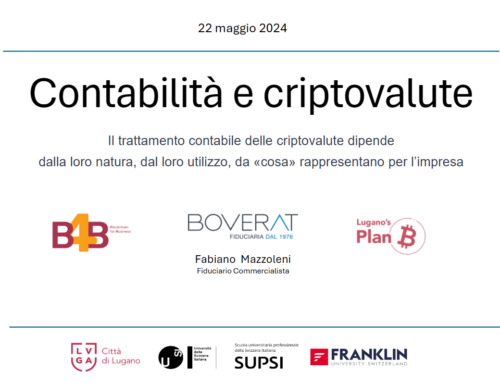Tax approach to cryptocurrencies in Switzerland in 2023
Cryptocurrencies are an increasingly present reality in the global economic and financial landscape. But how are they treated from a tax point of view? What are the rules governing their operations in Switzerland? What are the tax implications for those who use or hold them? In this article we will try to clarify the tax approach to cryptocurrencies in Switzerland in 2023 by analyzing the different types of activities related to cryptocurrencies and the related tax consequences.
In Switzerland, cryptocurrencies are considered digital assets and not fiat currencies. This means that their operations are subject to different tax rules depending on the type of business they carry out and who owns them.
In general, three types of activities related to cryptocurrencies can be distinguished:
mining, trading and payment.
Mining consists of creating new units of cryptocurrency through a computational process that requires a lot of electricity.
As far as mining is concerned, the income deriving from this activity is considered as income from independent activity and is taxed according to the ordinary regime. Expenses incurred for mining, such as electricity or hardware purchases, are deductible from taxable income. Cryptocurrencies created by mining are valued at their market value at the time of their generation.
Trading consists of buying and selling cryptocurrencies on the market, taking advantage of changes in their prices.
As far as trading is concerned, the income deriving from this activity is considered as capital income if the subject who realizes it is a natural person acting in a private capacity. In this case, the capital gains realized from the sale of cryptocurrencies are exempt from tax, while the capital losses are not deductible. Cryptocurrencies held for trading purposes are valued at their market value as at 31 December each year and are subject to wealth tax.
If, on the other hand, the person who makes the income from trading is a legal person or a natural person acting in a professional capacity, the capital gains and losses are considered as income from a commercial activity and are taxed according to the ordinary regime. In this case, expenses incurred in trading, such as commissions or management costs, are deductible from taxable income.
Payment consists of using cryptocurrencies as a means of exchange to purchase goods or services
For. as far as payment is concerned, the revenues deriving from this activity are considered as income from the provision of services if the person receiving them is a natural or legal person who offers goods or services in exchange for cryptocurrencies. In this case, the revenues are valued at their market value at the time of their receipt and are taxed according to the ordinary regime. Expenses incurred in payment, such as commissions or conversion costs, are deductible from taxable income.
If, on the other hand, the person making the payment is a natural or legal person who purchases goods or services with cryptocurrencies, there is no direct tax consequence. However, if the subject has purchased the cryptocurrencies at a lower price than the one at which he uses them for payment, an implicit capital gain is realized which is taxed according to trading rules.
In conclusion,
the tax regulation of cryptocurrencies in Switzerland is quite complex and depends on several factors. It is therefore advisable to consult an expert before undertaking any activity related to cryptocurrencies.
If you want to know more we will be happy to talk to you, contact us!






